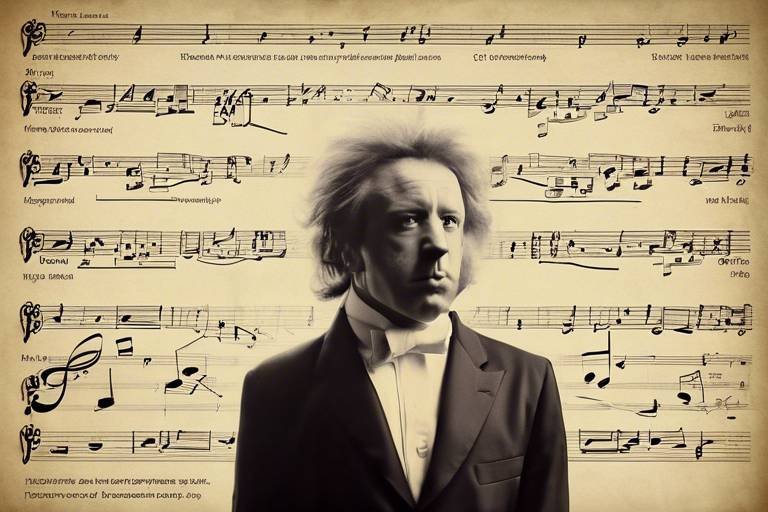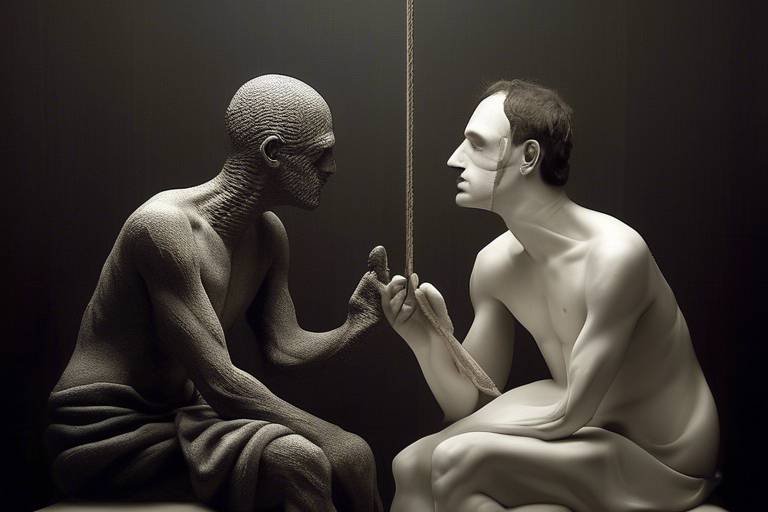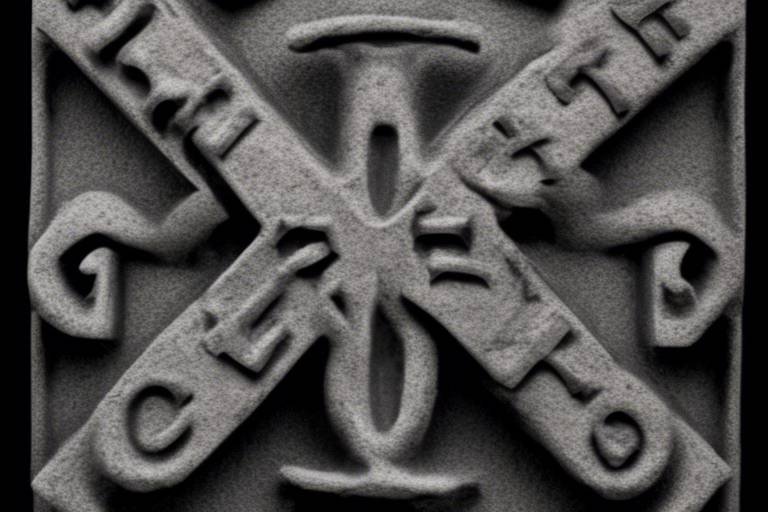Nietzsche and the Overman: A Philosophical Discourse
Friedrich Nietzsche, a name that echoes through the corridors of philosophical thought, is often most remembered for his provocative ideas that challenge the status quo. One of his most intriguing concepts is that of the Overman, a figure that embodies the pinnacle of human potential and self-overcoming. But what exactly does Nietzsche mean by the Overman, and why is it significant in our understanding of individualism and morality? In this article, we will delve into the depths of Nietzsche's philosophy, exploring the essence of the Overman and its implications for contemporary society.
At its core, the Overman represents an idealized version of humanity, one that transcends the limitations imposed by societal norms and conventional morality. Nietzsche defines the Overman as a being who has mastered the art of self-creation, who is not bound by the herd mentality that often dictates human behavior. This figure is characterized by a profound sense of individuality and a relentless pursuit of personal growth. Imagine a sculptor who sees a block of marble not as a mere stone but as a canvas for their creativity; similarly, the Overman sees life as a series of opportunities for self-expression and transformation.
The philosophical significance of the Overman lies in its challenge to traditional values. Nietzsche posits that humanity is in a state of flux, and the Overman serves as a beacon of what we can aspire to become. This ideal encourages individuals to question their beliefs, to reject complacency, and to embrace the chaos of existence as a pathway to greatness. In a world often dominated by fear and conformity, the Overman stands as a symbol of hope and potential.
The journey toward becoming an Overman is deeply intertwined with the concept of individualism. Nietzsche advocates for a radical form of self-overcoming, where individuals are urged to break free from societal constraints and embrace their unique identities. This process is not merely about achieving personal goals; it is about a fundamental transformation of the self. Imagine climbing a mountain: each step upward represents a challenge, a moment of struggle that ultimately leads to a broader perspective and a deeper understanding of one's capabilities.
To illustrate this idea, consider the following aspects of individualism as related to the Overman:
- Authenticity: The Overman embodies authenticity, living life according to their values rather than succumbing to external pressures.
- Creativity: This figure thrives on creative expression, often challenging societal norms through art, innovation, and thought.
- Resilience: The journey of self-overcoming is fraught with obstacles, but the Overman views suffering as a catalyst for growth.
Central to Nietzsche's philosophy is the concept of the Will to Power, which he describes as an intrinsic drive that compels individuals to assert themselves and strive for mastery over their circumstances. This drive is not merely about domination over others; rather, it is about mastering oneself and realizing one's full potential. The Overman exemplifies this will, channeling it into creative endeavors and personal development. Think of the Overman as a river, constantly flowing and adapting, carving new paths through the landscape of existence.
For the Overman, creative expression is not just a pastime; it is a vital means of transcending societal limitations. Nietzsche believed that art and innovation are powerful tools for individuals to assert their identities and challenge the status quo. The Overman uses creativity as a form of self-assertion, pushing boundaries and redefining what is possible. This is akin to an artist who, through their work, invites the world to see life from a different perspective, reshaping perceptions and inspiring others to think differently.
One of the most striking aspects of the Overman's philosophy is its rejection of herd morality. Nietzsche critiques the tendency of individuals to conform to societal norms without questioning their validity. The Overman, in contrast, dares to challenge these conventions, seeking authenticity in a world filled with mediocrity. This stance is not just about rebellion; it is about the pursuit of a more profound truth, one that aligns with personal values rather than collective expectations. Imagine a lone wolf, navigating the wilderness, unbound by the pack's rules, and forging its own path.
In Nietzschean thought, suffering is not merely an obstacle to be avoided; it is a transformative force that shapes the journey toward becoming an Overman. Nietzsche suggests that through adversity, individuals can discover their true strength and potential. Rather than viewing suffering as a burden, the Overman embraces it as a necessary part of growth. Just as a diamond is formed under pressure, so too can individuals emerge from their struggles with newfound clarity and purpose.
Nietzsche's concept of the Overman resonates powerfully in modern society, influencing various fields such as psychology, art, and personal development. In a world where conformity often reigns, the Overman serves as a reminder of the importance of individuality and self-actualization. Many contemporary thinkers and artists draw inspiration from Nietzsche's ideas, using them as a framework for exploring freedom, responsibility, and the quest for meaning in an increasingly complex world.
Nietzsche's Overman has significantly impacted existentialist thinkers, who share similar themes of freedom and the search for meaning. Just as the Overman embodies self-overcoming, existentialists emphasize the importance of personal responsibility and the pursuit of authenticity. This interconnectedness highlights the enduring relevance of Nietzsche's philosophy in contemporary discussions about what it means to live a meaningful life.
Despite its profound insights, Nietzsche's concept of the Overman has faced critiques and misinterpretations. Some critics argue that it promotes elitism or a disregard for social responsibility. However, these interpretations often overlook Nietzsche's intention to inspire individuals to embrace their potential while remaining aware of their impact on others. Understanding the Overman requires a nuanced approach that recognizes the complexity of Nietzsche's thought and its implications for personal and societal growth.
Q: What is the Overman in Nietzsche's philosophy?
A: The Overman is an idealized figure representing the pinnacle of human potential, characterized by individuality, creativity, and the ability to transcend societal norms.
Q: How does the Overman relate to individualism?
A: The Overman embodies individualism by encouraging self-overcoming and personal growth, challenging individuals to embrace their unique identities and reject conformity.
Q: What role does suffering play in becoming an Overman?
A: Suffering is viewed as a transformative force in Nietzschean philosophy, shaping individuals and helping them discover their true strength and potential.
Q: How is Nietzsche's Overman relevant today?
A: The Overman resonates in modern society by influencing discussions in psychology, art, and personal development, emphasizing the importance of individuality and self-actualization.

The Concept of the Overman
Friedrich Nietzsche’s concept of the Overman, or Übermensch, is one of the cornerstones of his philosophical thought. At its core, the Overman represents an idealized individual who transcends the limitations of conventional humanity. But what does it mean to be an Overman? Nietzsche defines the Overman as someone who creates their own values and lives authentically, free from the constraints of societal norms and herd mentality. In a world where people often conform to the expectations imposed by others, the Overman stands as a beacon of individualism and self-determination.
The characteristics of the Overman can be distilled into several key traits. Firstly, the Overman is a master of their own fate, embracing the Will to Power—a fundamental drive that compels individuals to assert their strength, creativity, and influence over their surroundings. This drive is not merely about domination over others; rather, it signifies an inner strength that fuels personal growth and self-actualization. The Overman also embodies a profound sense of creativity, using art and innovation as tools to break free from the shackles of mediocrity and express their unique vision of life.
Nietzsche's Overman is also marked by a rejection of herd morality. In his view, the majority often adhere to a set of moral standards that stifle individuality and promote conformity. The Overman, however, challenges these norms, seeking authenticity in a world filled with artificial values. This rejection is not an act of rebellion for the sake of rebellion; it is a necessary step towards realizing one's potential and achieving true freedom. The Overman is, therefore, a symbol of the struggle against mediocrity—a call to arms for those willing to forge their own paths.
In Nietzsche's broader existential framework, the Overman serves as a catalyst for human potential. He encourages individuals to embrace their passions, confront their fears, and ultimately transform their lives through self-overcoming. This journey is often fraught with challenges, but it is through these trials that one can truly embody the essence of the Overman. In essence, Nietzsche's vision of the Overman invites us to question our values, redefine our identities, and aspire to greatness beyond the ordinary.

Individualism and Self-Overcoming
Friedrich Nietzsche's philosophy is deeply rooted in the concept of individualism, which he believes is essential for the emergence of the Overman. To Nietzsche, individualism is not merely a personal choice; it is a fundamental aspect of human existence that challenges societal norms and expectations. The Overman, as Nietzsche describes, embodies the pinnacle of individual achievement and self-realization. This journey towards becoming an Overman is marked by a process of self-overcoming, where one must confront and conquer internal and external obstacles.
Self-overcoming is crucial in Nietzsche's philosophy because it signifies a rejection of complacency and mediocrity. It is about pushing oneself beyond the limits imposed by society, tradition, and even one’s own fears. Imagine standing at the base of a mountain, looking up at its peak. The climb is daunting, filled with potential slips and falls, yet the view from the top promises unparalleled beauty and fulfillment. This metaphor captures the essence of self-overcoming, where each step taken towards the summit represents a victory over doubt and conformity.
The process of self-overcoming requires a profound commitment to personal growth and transformation. Nietzsche posits that individuals must embrace their Will to Power, which is not merely a desire for domination but a drive for mastery over oneself. This inner strength propels individuals to challenge their limitations, pursue their passions, and forge their paths. In a world that often promotes uniformity, the Overman stands out as a beacon of authenticity and creative expression.
Moreover, Nietzsche emphasizes the importance of self-reflection in this journey. It’s not enough to merely strive for greatness; one must also engage in a rigorous examination of one’s beliefs, values, and motivations. This introspective process allows individuals to discard the herd mentality that often stifles creativity and personal growth. By understanding and redefining what it means to live authentically, one can begin to cultivate a life that is true to oneself rather than a mere echo of societal expectations.
In this context, the Overman is not a fixed ideal but an ongoing process of becoming. It’s a continual cycle of setting goals, facing challenges, and rising above them. This dynamic nature of individualism and self-overcoming is what makes Nietzsche’s philosophy so relevant today. In a time when many feel lost in the crowd, the call to embrace one’s individuality and strive for personal excellence resonates strongly.
Ultimately, Nietzsche’s vision of the Overman serves as an invitation to each of us to embark on our own journey of self-discovery. It challenges us to ask: What does it mean to live authentically? How can we break free from the constraints of societal expectations and embrace our unique paths? By engaging with these questions, we can begin to forge our identities and contribute meaningfully to the world around us.
- What is the Overman in Nietzsche's philosophy?
The Overman represents an ideal individual who transcends conventional morality and societal norms, embodying self-overcoming and personal excellence. - How does self-overcoming relate to individualism?
Self-overcoming is a key component of individualism in Nietzsche's philosophy, emphasizing the importance of personal growth and the rejection of mediocrity. - What role does the Will to Power play in self-overcoming?
The Will to Power is a driving force that motivates individuals to master themselves and pursue their passions, essential for achieving the status of the Overman.

The Will to Power
Friedrich Nietzsche's concept of the Will to Power is one of the cornerstones of his philosophy, intricately linked to the idea of the Overman. At its core, the Will to Power is not merely about a desire for dominance over others; rather, it encapsulates a profound drive for self-actualization and mastery over oneself. Imagine it as an inner engine that propels individuals to push beyond their limits, to grow, and to evolve. This drive is what separates the Overman from the average person; it is a relentless pursuit of personal excellence and authenticity.
Nietzsche believed that the Will to Power manifests in various forms, influencing our actions, ambitions, and even our relationships. It is this fundamental force that encourages individuals to challenge societal norms and conventions, seeking to carve out their own paths. In a world that often seeks to impose restrictions, the Overman embodies the spirit of rebellion and creativity, thriving on the energy generated by this will.
The Will to Power can be understood through several key aspects:
- Self-Overcoming: This is the idea that one must constantly strive to surpass their current self. The Overman is not static; instead, they are in a perpetual state of evolution, seeking to improve and refine their character.
- Creative Expression: The Will to Power fuels artistic and intellectual endeavors. It is through creativity that individuals can express their unique perspectives and challenge the status quo.
- Assertion of Values: The Overman creates their own values rather than adhering to those imposed by society. This act of value creation is a powerful assertion of one's individuality.
To further illustrate the significance of the Will to Power, consider the following table that summarizes its key characteristics and implications in relation to the Overman:
| Characteristic | Description |
|---|---|
| Dynamic Growth | The Overman is always evolving, embracing change and challenges as opportunities for growth. |
| Creative Freedom | Through the Will to Power, individuals express their creativity, breaking free from societal constraints. |
| Personal Responsibility | The Overman takes responsibility for their own values and choices, rejecting herd mentality. |
In essence, the Will to Power is about harnessing one’s inner strength and potential. It encourages us to confront our fears, embrace our passions, and strive for greatness. Nietzsche's vision of the Overman serves as a powerful reminder that we are not merely products of our environment, but rather, we have the capacity to shape our destinies. The Overman, fueled by the Will to Power, challenges us to rise above mediocrity and to embark on a journey of self-discovery and transformation.

Creative Expression
Friedrich Nietzsche's concept of the Overman is not just a philosophical abstraction; it is deeply intertwined with the idea of . For Nietzsche, the Overman embodies a spirit of innovation and artistry that transcends societal norms and expectations. Imagine a world where every individual could harness their creative potential, breaking free from the chains of conformity. This is the essence of the Overman—a figure who dares to challenge the status quo and redefine what it means to be human.
Creative expression, in this context, is more than mere artistic endeavor; it is a form of self-actualization. Nietzsche believed that through creativity, individuals can explore their innermost thoughts and feelings, ultimately leading to a greater understanding of themselves and their place in the world. The Overman, therefore, serves as a beacon for those willing to embark on this journey of self-discovery. By embracing their unique talents and perspectives, individuals can contribute to a richer, more diverse tapestry of human experience.
Consider the impact of art and innovation on society. Throughout history, artists, writers, and thinkers have acted as catalysts for change, challenging prevailing beliefs and inspiring others to think differently. Nietzsche saw this as a crucial aspect of the Overman's existence. By expressing their individuality through creative means, they not only elevate their own lives but also encourage others to pursue their paths of self-overcoming. This ripple effect can lead to profound societal transformation.
Moreover, the Overman's creative expression often involves a rejection of traditional boundaries. In a world that frequently dictates how one should think and create, the Overman breaks free from these constraints, much like a bird soaring above the clouds. This act of defiance is not merely rebellious; it is a necessary step toward achieving true authenticity. The Overman recognizes that to create is to live fully, to embrace the chaos of existence, and to find beauty in the struggle.
In practical terms, this philosophy can manifest in various forms of creative expression, including:
- Visual Arts: Painters and sculptors who challenge conventional aesthetics.
- Literature: Writers who explore themes of existentialism and individualism.
- Performing Arts: Actors and musicians who push the boundaries of their crafts.
- Innovation: Entrepreneurs and inventors who disrupt markets with new ideas.
Ultimately, Nietzsche's vision of the Overman as a champion of creative expression invites us to reflect on our own lives. Are we merely conforming to societal expectations, or are we embracing our unique voices? The journey of the Overman is not just for a select few; it is a call to each of us to tap into our creative potential and express our individuality. In doing so, we not only honor ourselves but also contribute to a more vibrant and dynamic world.
- What is the Overman in Nietzsche's philosophy?
The Overman, or Übermensch, is a concept introduced by Nietzsche representing an individual who transcends conventional morality and societal norms to create their own values. - How does creative expression relate to the Overman?
Creative expression is a fundamental aspect of the Overman, as it allows individuals to explore their uniqueness and challenge societal constraints. - Why is self-actualization important in Nietzschean philosophy?
Self-actualization is crucial because it enables individuals to realize their full potential, leading to personal growth and a deeper understanding of existence. - Can anyone aspire to be an Overman?
Yes, Nietzsche's concept encourages everyone to embrace their individuality and pursue their creative paths, making the idea of the Overman accessible to all.

Rejection of Herd Morality
Friedrich Nietzsche's concept of the Overman is intricately tied to his critique of what he termed "herd morality." In essence, herd morality refers to the set of values and norms that are adopted by the majority, often at the expense of individual thought and authenticity. Nietzsche believed that this conformity stifles creativity and individuality, leading people to live lives that are dictated by societal expectations rather than personal convictions. The Overman, in stark contrast, embodies a radical rejection of these imposed moral frameworks, striving instead for a life defined by personal values and self-determination.
Nietzsche argued that herd morality is rooted in weakness; it thrives on the collective fears and insecurities of individuals who seek safety in numbers. This collective mindset fosters mediocrity, where people are encouraged to blend in rather than stand out. The Overman, however, is characterized by a boldness that defies societal norms. He is the individual who dares to question the status quo, challenging the accepted beliefs that govern moral behavior. This rejection is not merely an act of rebellion but a profound assertion of one's own will and values.
To illustrate this point, consider the following characteristics of the Overman in relation to herd morality:
- Authenticity: The Overman seeks to live authentically, crafting a personal moral code that reflects his true self rather than adhering to the collective standards.
- Creativity: By rejecting herd morality, the Overman opens the door to creative expression, allowing for innovation and new ideas to flourish.
- Individual Responsibility: The Overman accepts the weight of his choices, understanding that true freedom comes with the responsibility of shaping one's own destiny.
Nietzsche's critique of herd morality extends to the way individuals often succumb to the pressures of societal approval. He believed that many people live inauthentic lives, shaped by the expectations of others rather than their own desires. This is where the Overman distinguishes himself; he embraces the discomfort of being different, recognizing that true greatness often comes from standing apart from the crowd. In doing so, he not only liberates himself but also inspires others to question their own adherence to herd morality.
Furthermore, Nietzsche posited that herd morality is a product of fear—fear of ostracism, fear of failure, and fear of the unknown. The Overman, however, confronts these fears head-on. He understands that suffering and struggle are integral to the human experience and that they can lead to profound personal growth. By embracing this struggle, the Overman transforms adversity into a catalyst for self-overcoming, ultimately transcending the limitations imposed by societal norms.
In conclusion, the rejection of herd morality is a cornerstone of Nietzsche's philosophy and the concept of the Overman. It challenges individuals to rise above societal expectations and cultivate their own values. The journey towards becoming an Overman is not an easy one; it requires courage, introspection, and a willingness to embrace one's individuality. By doing so, individuals can unlock their true potential and contribute to the evolution of human thought and culture.
- What is herd morality? Herd morality refers to the collective values and norms adopted by society, often leading to conformity and a lack of individual thought.
- How does the Overman differ from the average person? The Overman rejects societal norms and creates his own values, while the average person often conforms to herd morality.
- Why is the rejection of herd morality important? Rejecting herd morality allows for personal authenticity, creativity, and the acceptance of individual responsibility.
- What role does suffering play in Nietzsche's philosophy? Suffering is seen as a transformative experience that can lead to personal growth and self-overcoming.

The Role of Suffering
Friedrich Nietzsche had a rather unique perspective on suffering, viewing it not merely as a painful experience to be avoided but as a crucial element of human existence. He believed that suffering could serve as a powerful catalyst for personal growth and transformation. In Nietzsche's philosophy, the Overman, or Übermensch, emerges through the crucible of adversity. This raises an intriguing question: can we truly understand our potential without experiencing hardship?
Nietzsche famously stated, “What does not kill me makes me stronger.” This quote encapsulates his belief that suffering can lead to greater resilience and self-awareness. For Nietzsche, suffering is not just an obstacle; it's a necessary part of life that shapes our character and fortifies our will. It pushes us to confront our limitations, challenge societal norms, and ultimately strive for self-overcoming. The Overman embodies this journey, transforming pain into strength and using it as a stepping stone towards higher aspirations.
In a world that often glorifies comfort and ease, Nietzsche’s philosophy stands in stark contrast. He invites us to embrace suffering, suggesting that it is through our struggles that we discover our true selves. This perspective resonates with many contemporary thinkers and psychologists who argue that adversity can lead to significant personal development. Just as a diamond is formed under pressure, so too can our inner potential be revealed through the trials we face.
Moreover, Nietzsche highlights the importance of embracing suffering as a means of achieving authenticity. He critiques the notion of a life devoid of challenges, arguing that such a life lacks depth and meaning. In his view, the Overman is not someone who avoids suffering but rather someone who confronts it head-on, using it as fuel for creative expression and personal evolution. This idea invites us to reflect on our own experiences: how have our struggles shaped who we are today?
To further illustrate Nietzsche's thoughts on suffering, let’s consider a few key points:
- Suffering as a Teacher: Each struggle we face can provide valuable lessons, teaching us about our strengths and weaknesses.
- Growth through Adversity: Overcoming challenges can lead to profound personal growth, pushing us beyond our perceived limits.
- Embracing Authenticity: By facing suffering, we can strip away societal expectations and discover our true selves.
Ultimately, Nietzsche's concept of the Overman challenges us to rethink our relationship with suffering. Instead of viewing it as something to be feared or avoided, he encourages us to see it as an essential part of our human experience. By embracing suffering, we can unlock our potential, cultivate resilience, and strive towards becoming our best selves. So, the next time you encounter a challenge, remember: it might just be the catalyst you need to become the Overman of your own life.
- What is the Overman in Nietzsche's philosophy? The Overman represents an individual who transcends conventional morality and societal norms, embodying self-overcoming and creative expression.
- How does suffering contribute to personal growth? According to Nietzsche, suffering acts as a catalyst for self-awareness and resilience, allowing individuals to confront their limitations and achieve personal transformation.
- Can suffering lead to authenticity? Yes, Nietzsche believed that facing suffering helps individuals strip away societal expectations and discover their true selves, leading to a more authentic existence.

Contemporary Relevance
Friedrich Nietzsche's concept of the Overman is not just a relic of 19th-century philosophy; it resonates deeply within the fabric of contemporary thought. As we navigate an increasingly complex world, the ideals of individualism, self-overcoming, and authenticity that Nietzsche championed are more relevant than ever. In a society often dictated by conformity and collective norms, the Overman stands as a beacon of personal empowerment and creative freedom. But how does this ancient philosophy find its place in our modern lives?
One of the most striking aspects of Nietzsche's Overman is its profound influence on various fields, including psychology, art, and personal development. For instance, in psychology, the Overman embodies the quest for self-actualization, a concept that has been echoed in the works of modern psychologists like Abraham Maslow. Maslow's hierarchy of needs culminates in self-actualization, which mirrors Nietzsche's idea of transcending one’s limitations to achieve personal greatness. This journey of self-discovery and mastery is akin to climbing a mountain; while the ascent can be grueling, the view from the top offers a perspective that is both liberating and enlightening.
Moreover, the Overman's emphasis on creative expression continues to inspire artists and innovators today. In a world saturated with mass-produced content, the call for originality and authenticity is a clarion call to break free from the shackles of societal expectations. Just as the Overman creates his own values, contemporary artists are encouraged to forge their unique paths, challenging the status quo and redefining what it means to be truly expressive. This creative rebellion can be seen in various art movements that prioritize individual expression over conventional techniques, leading to a rich tapestry of diverse voices.
However, it’s essential to recognize that Nietzsche's ideas have not gone unchallenged. The Overman has often been misinterpreted or co-opted by various ideologies, leading to critiques that misconstrue Nietzsche's intentions. Many critics argue that the concept promotes elitism or a disregard for community values. Yet, when we delve deeper, we find that Nietzsche was advocating for a radical form of authenticity that encourages individuals to rise above herd mentality, rather than dismissing the importance of community altogether. The Overman is not a lone wolf but rather a pioneer who inspires others to embark on their journeys of self-discovery.
In summary, Nietzsche's Overman remains a powerful symbol of individual potential and creative expression in contemporary society. As we grapple with the challenges of modern life, the call to embrace our inner Overman may just be the antidote we need to navigate the complexities of existence. By fostering self-overcoming and rejecting the limitations imposed by conventional morality, we can unlock a world of possibilities that resonate with Nietzsche's vision for humanity.
- What is the Overman in Nietzsche's philosophy?
The Overman, or Übermensch, represents an individual who transcends conventional morality and societal norms, creating their own values and embracing self-overcoming.
- How does the Overman relate to individualism?
The Overman embodies the essence of individualism by encouraging personal growth and the rejection of herd mentality, emphasizing the importance of authenticity.
- What is the significance of creative expression in Nietzsche's concept of the Overman?
Creative expression is vital for the Overman, as it allows individuals to break free from societal constraints and explore their unique identities and potentials.
- How has Nietzsche's idea of the Overman influenced modern thought?
The Overman has influenced various fields, including psychology and art, promoting themes of self-actualization, personal empowerment, and the importance of authenticity.

Influence on Existentialism
Friedrich Nietzsche's concept of the Overman has left an indelible mark on existentialist thought, shaping the way we view freedom, responsibility, and the quest for meaning in our lives. The Overman, or Übermensch, embodies a radical departure from traditional values, urging individuals to transcend societal norms and embrace their true potential. This idea resonates deeply with existentialist thinkers like Jean-Paul Sartre and Albert Camus, who grappled with similar themes of individual agency and the search for authenticity in a seemingly indifferent universe.
At the heart of existentialism is the belief that existence precedes essence, meaning that individuals are not defined by predetermined roles or societal expectations. Instead, they have the power to forge their own identities through choices and actions. Nietzsche's Overman aligns with this philosophy by advocating for a life lived authentically, where one creates their own values rather than adhering to the herd mentality. This is a powerful call to embrace personal freedom and responsibility, emphasizing that we are the architects of our own destinies.
One of the most compelling aspects of Nietzsche's influence on existentialism is the notion of self-overcoming. Just as the Overman represents the pinnacle of human potential, existentialist thinkers emphasize the importance of personal growth and the continual pursuit of self-improvement. This journey often involves confronting uncomfortable truths about oneself and the world, much like the Overman who embraces challenges as opportunities for transformation. The existentialist mantra of "existence is struggle" mirrors Nietzsche's idea that suffering can lead to profound personal development.
Additionally, the concept of the Will to Power plays a crucial role in bridging Nietzschean philosophy with existentialism. This idea posits that the fundamental driving force behind human behavior is not merely survival or reproduction, but a deep-seated desire to assert one's influence and mastery over oneself and one's environment. Existentialists echo this sentiment by emphasizing the importance of taking ownership of one's choices and actions, thereby asserting one's existence in a world filled with chaos and uncertainty.
However, while Nietzsche's Overman encourages individuals to rise above societal constraints, existentialists also caution against the potential pitfalls of radical individualism. They recognize that the pursuit of personal freedom can sometimes lead to isolation or despair if not balanced with a sense of connection to others. This tension between individuality and community is a recurring theme in existentialist literature, reflecting the complex nature of the human experience.
In summary, the influence of Nietzsche's Overman on existentialism is profound and multifaceted. Both philosophies champion the ideals of personal freedom, self-creation, and the transformative power of struggle. As we navigate the complexities of modern life, these ideas continue to resonate, challenging us to embrace our potential and confront the existential dilemmas that define our existence.
- What is the Overman in Nietzsche's philosophy? The Overman, or Übermensch, represents an idealized individual who transcends conventional morality and societal norms to create personal values and meaning.
- How does Nietzsche's concept of the Overman relate to existentialism? The Overman emphasizes personal freedom and self-overcoming, themes that are central to existentialist thought, which values individual agency and authenticity.
- What is the Will to Power? The Will to Power is a fundamental concept in Nietzsche's philosophy, suggesting that the primary driving force in humans is the desire to assert control and mastery over oneself and the environment.
- How do existentialists view the idea of individualism? While existentialists embrace individualism, they also highlight the importance of community and relationships, warning against the potential isolation that can arise from radical individualism.

Critiques and Misinterpretations
Friedrich Nietzsche's concept of the Overman has sparked a myriad of critiques and misinterpretations since its inception. Many readers often approach Nietzsche's philosophy with preconceived notions, leading to misunderstandings that can distort the essence of his ideas. For instance, the Overman is frequently misconstrued as an advocate for elitism or a justification for oppression. This perception arises from a superficial reading of Nietzsche's work, where the term 'Overman' is mistakenly equated with superiority over others rather than a profound journey toward self-mastery and individual excellence.
At the heart of these critiques lies a fundamental misunderstanding of Nietzsche's rejection of herd morality. Critics often argue that Nietzsche promotes a ruthless individualism that disregards communal values and ethical responsibilities. However, this interpretation misses the nuance of his philosophy. Nietzsche's Overman does not seek to dominate others but rather to transcend the limitations imposed by societal norms. In fact, Nietzsche believed that true strength comes from embracing one's individuality while also recognizing the interconnectedness of all human beings.
Another common misinterpretation is the association of the Overman with nihilism. Some argue that Nietzsche's philosophy leads to a sense of despair or meaninglessness, suggesting that if traditional moral values are rejected, then life lacks purpose. Yet, this view overlooks Nietzsche's affirmation of life and the potential for individuals to create their own values and meanings. The Overman represents a figure who not only recognizes the absence of inherent meaning but also actively engages in the process of crafting a fulfilling existence through creativity and personal growth.
Moreover, the concept of the Will to Power, which is integral to Nietzsche's philosophy, is often misrepresented as a mere desire for domination. Critics may argue that Nietzsche's emphasis on power leads to a justification of violence or authoritarianism. However, the Will to Power, in its truest sense, is about the drive for self-actualization and the pursuit of one's potential. It is a call to harness one's inner strength and creativity, rather than an endorsement of oppression or tyranny.
To better understand these critiques and misinterpretations, it is essential to engage with Nietzsche's work holistically. His writings, laden with metaphor and paradox, require careful reading and interpretation. For instance, many of Nietzsche's ideas can be summarized in a table that highlights common misconceptions versus the intended meanings:
| Misinterpretation | Intended Meaning |
|---|---|
| Overman as elitist | Overman as self-mastered individual |
| Rejection of morality as nihilism | Creation of personal values and meaning |
| Will to Power as domination | Will to Power as self-actualization |
In conclusion, Nietzsche's concept of the Overman invites us to challenge our assumptions and engage deeply with the complexities of his thought. By addressing these critiques and misinterpretations, we can appreciate the profound implications of his philosophy for personal growth, creativity, and the quest for authenticity in a world that often pressures conformity. Understanding Nietzsche's vision of the Overman not only enriches our grasp of his ideas but also encourages us to embark on our own journeys of self-discovery and transformation.
- What does Nietzsche mean by the Overman?
The Overman, or Übermensch, is a concept representing an individual who transcends conventional morality and societal norms to create their own values and purpose. - Is the Overman an elitist figure?
No, the Overman is not about elitism. It emphasizes personal growth and self-mastery rather than superiority over others. - How does the Will to Power relate to the Overman?
The Will to Power is about the drive for self-actualization and creativity, essential qualities for becoming an Overman. - What are common misconceptions about Nietzsche's philosophy?
Common misconceptions include viewing Nietzsche as a nihilist or an advocate for domination, which misrepresents his true intentions of promoting individuality and meaning-making.
Frequently Asked Questions
- What is Nietzsche's concept of the Overman?
The Overman, or Übermensch, is a central figure in Nietzsche's philosophy, representing an individual who transcends traditional morality and societal norms. This concept emphasizes self-overcoming, creativity, and the pursuit of personal excellence. The Overman embodies the idea of becoming who you truly are, rather than conforming to the expectations of the herd.
- How does individualism relate to the Overman?
Individualism is crucial to the idea of the Overman. Nietzsche believed that true personal growth comes from the ability to challenge oneself and rise above the limitations imposed by society. The Overman is a symbol of personal empowerment, encouraging individuals to forge their own paths and define their own values, rather than simply adhering to conventional beliefs.
- What is the Will to Power?
The Will to Power is a fundamental concept in Nietzsche's philosophy, representing the intrinsic drive within individuals to assert and enhance their own existence. It is closely tied to the Overman, as this drive motivates self-actualization and mastery over oneself. Nietzsche viewed the Will to Power as a creative force that fuels personal growth and transformation.
- How does the Overman relate to creative expression?
The Overman is seen as the ultimate creator, someone who embraces artistic and innovative expression as a means of transcending societal constraints. Nietzsche believed that through creativity, individuals could challenge the status quo and express their unique perspectives, ultimately leading to personal and cultural evolution.
- What is herd morality, and how does the Overman reject it?
Herd morality refers to the conventional moral values that are commonly accepted by society, often at the expense of individuality. The Overman rejects this notion, advocating for authenticity and personal values instead. Nietzsche critiqued herd mentality, arguing that true moral insight comes from self-reflection and personal experience rather than blind adherence to societal norms.
- How does suffering play a role in Nietzsche's philosophy?
Suffering, in Nietzschean thought, is not merely a negative experience but a transformative one. He believed that enduring and overcoming suffering can lead to personal growth and the development of the Overman. This perspective suggests that adversity can be a powerful catalyst for self-discovery and strength.
- What is the contemporary relevance of the Overman?
Nietzsche's concept of the Overman continues to resonate in modern discussions around personal development, psychology, and art. Many contemporary thinkers draw parallels between the Overman and themes of existentialism, emphasizing the importance of individual freedom, responsibility, and the quest for meaning in a complex world.
- How has Nietzsche’s Overman influenced existentialist thought?
The Overman has significantly influenced existentialist philosophers by highlighting themes of freedom, self-creation, and the search for meaning. Existentialists like Jean-Paul Sartre and Albert Camus echo Nietzsche's ideas, advocating for the importance of individual choice and the responsibility that comes with it.
- What are some common critiques of Nietzsche's Overman?
Critics often misinterpret the Overman as promoting elitism or nihilism. However, Nietzsche's intention was to inspire individuals to seek authenticity and personal growth rather than to establish a hierarchy of worth. Understanding the Overman requires recognizing the emphasis on self-empowerment and the rejection of conventional moral standards.



















